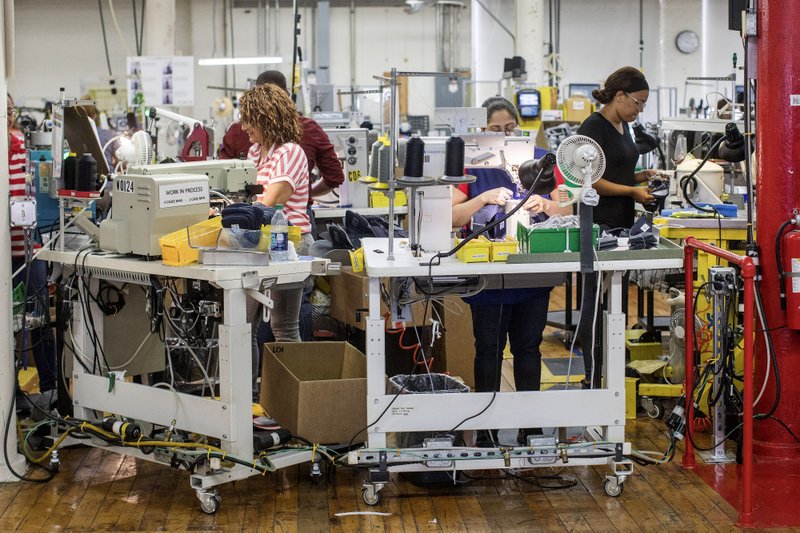New Balance Athletics Inc. has long advocated for and benefited from tariffs, competing with Nike Inc. and other footwear companies while still making shoes in the U.S. Now, it's among the critics of President Donald Trump's duties testifying at a public hearing that started Monday.
The Boston-based firm said while it supports Trump's efforts to force China to address intellectual-property theft in a trade deal, its U.S. factories are supported by a global supply chain connected to China and built over decades. Duties on soles and other components would hurt the business, as do China's retaliatory tariffs on U.S. exports, the company said.
Trump's proposed levies won't "just translate into higher costs, but jeopardize our ability to maintain production levels and continue investing in our domestic factories," New Balance Vice President Monica Gorman said in comments posted online.
About 320 officials from U.S. manufacturers, retailers and other companies and trade groups are set to appear over seven days of hearings at the U.S. International Trade Commission before panels of officials from the Office of U.S. Trade Representative and other agencies. While some companies, including Rheem Manufacturing Co., support the duties, most are arguing that Trump shouldn't tax their products.
The footwear firm is among the U.S. companies lining up for the hearing to drive home a now-common point: Trump's proposed tariffs are bad for business. The latest wave of threatened duties would hit essentially all remaining imports from China, including mobile phones, laptops, apparel and other consumer items.
New Balance has long pushed to supply U.S.-made shoes to the Pentagon and argued against reducing tariffs on imported finished footwear when the U.S. was negotiating the Trans-Pacific Partnership with 11 other nations earlier this decade. But Trump withdrew from the partnership in 2017, and his use of tariffs on goods and components has drawn opposition from a swath of U.S. companies and industries.
While Trump says China is paying the tariffs, economists say it's U.S. importers that pay them and some of that gets passed to consumers in higher prices. Companies also say they can't easily avoid them by moving operations outside China, as the president suggests.
"The rapid pace at which these tariffs may be imposed will leave no possible outcome, other than that the cost will be borne by U.S. companies, their employees, retail customers and ultimately the U.S. consumer," said Jeffrey Fischer, principal of Planet Gold Clothing Company Inc. in New York. He was among the first group to appear at the hearing Monday.
It's the fourth round of hearings after Trump levied duties on $250 billion of products last year. As talks on a trade deal with China faltered last month, he ordered a tariff increase to 25% from 10% on $200 billion of goods and has threatened to target an additional $300 billion in products from China that have so far been spared in his trade war with Beijing -- including consumer goods.
Retailers including Best Buy, Jo-Ann Stores and Forever 21 have asked to testify against duties on goods including computer tablets, smartwatches and artificial plants. Hallmark Cards said greeting cards and Christmas ornaments should be spared because of the impact on retailers, consumers and even the U.S. Postal Service.
Technology products account for more than half the value of the threatened tariffs, which would raise prices for consumers and could prove "catastrophic," especially for small- and medium-size firms, the Consumer Technology Association said.
Almost a quarter of the more than 3,800 targeted tariff lines involve goods such as textiles, apparel and footwear, according to the American Apparel & Footwear Association. That's attracted objections from companies including Ralph Lauren Corp., Columbia Sportswear Co. and Designer Brands Inc.
The proposed duties have also drawn opposition from companies that sell products including eyeglasses, fireworks, books, art, vinyl gloves, skis, fishing equipment, seafood, baby cribs and toys.
"Look out, American toy shoppers here comes the Grinch That Tariffed Christmas!" Wendy Lazar, the founder of I Heart Guts plush toy company in California, posted online.
The tariffs could be imposed after a seven-day rebuttal period after the last day of the hearings.
Eleven rounds of negotiations have failed to resolve the dispute over China's drive to surpass America's technological dominance.
Trump is still waiting for a response from Chinese President Xi Jinping about meeting to restart trade talks, economic adviser Larry Kudlow said last week, while warning that Beijing may face consequences it if refuses. Trump has repeatedly threatened to raise tariffs if Xi doesn't meet with him at the Group of 20 leaders' meeting from June 28-29 in Osaka, Japan.
Commerce Secretary Wilbur Ross downplayed the prospect of a major trade deal emerging from a possible meeting between the two presidents, telling The Wall Street Journal in an interview Sunday that the most he thinks will happen is an agreement to resume talks.
Walmart, Target and Macy's were among about 660 companies and associations that made a plea last week to Trump not to impose additional tariffs on Chinese goods, and to return to the negotiating table to strike a trade deal with Beijing.
The U.S. Chamber of Commerce is also filing comments urging the administration to finalize a deal that removes the tariffs. Despite attempts to assure Americans there's a strategy to resolve trade disputes without hurting U.S. interests, "these assurances lack the coherence that would provide comfort to those businesses, farms and workers whose livelihoods are being put at risk," the chamber said.
Information for this article was contributed by Mark Niquette and Ben Holland of Bloomberg News; and by Paul Wiseman of The Associated Press.
Business on 06/18/2019
